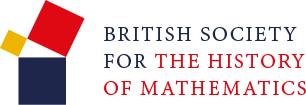History of Recreational Mathematics
History of Recreational Mathematics
Each year in May we run a history of mathematics conference at Birkbeck, organised by the British Society for the History of Mathematics (BSHM), and supported by the Department of Economics, Mathematics and Statistics at Birkbeck.
The 2019 event will be the fifth of these conferences, and will look at the history of recreational mathematics. There will be six speakers on a range of topics covering games, puzzles and the mathematics behind them from antiquity to the present day. The event will be held in the main Birkbeck building on Torrington Square.
Booking is open. Registration will be £5.50 for students, £11 for BSHM members and Birkbeck staff, and £22 for non-members.
This will include tea/coffee and biscuits at break times, but not lunch, as we wanted to keep the registration fee to a minimum. There are numerous places to eat within easy walking distance of Birkbeck, including a coffee shop that sells sandwiches and snacks within Birkbeck itself.
Downloadable programme and map
Programme
9:30 Registration and Coffee/Tea (room B04)
10.00 Opening remarks (lecture room B35)
10.10 Prof. David Singmaster (Emeritus Professor of Mathematics, London South Bank University)
The 17 camels and the 13 camels. The problem of the 17 camels to be divided as 1/2, 1/3, 1/9 is one of the older paradoxical puzzles. There are numerous versions of it, but hardly any careful analysis of it. I will explain the general problem and its solutions - there are 14 versions, including two pseudo versions. One author attributes the problem to Tartaglia, but no one has found it in his work. Numerous modern works claim it is of Islamic origin, but there is no definite evidence. Islamic Shi-ite tradition attributes it to the first Caliph, Imam 'Ali (601-664), but there is no documentation of this until the 18th century. In 1971, a variation, of dividing 13 camels as 1/2, 1/3, 1/4 was posed. This had never been analysed. I find many more versions than for the 17 camels.
10:55 Dr Albrecht Heeffer (Ghent University)
Récréations Mathématiques (1624): history and influence. This anonymous little book, published at the Jesuit university of Pont-à-Mousson in 1624 was the first to bear 'recreational mathematics' in its title. It went through more than eighty French editions, was translated into several other languages and had a profound influence, not only within the domain of mathematical games and puzzles but also for early-modern natural philosophy. This talk gives an overview of the history in the context of Jesuit eduction, discusses some of the problems and proposes an alternative thesis about its author.
11.40 Tea/Coffee
12:10 Mark Bolitho (www.creaselightning.co.uk)
Unfolding possibilities; Origami and Mathematics. Origami and Paperfolding have had a long association with Mathematics, from exploring Mathematical ideas inherent in folding to developing Mathematics to explain the folding process. The talk will look at some of Mathematical ideas that have been explored, from T. Sundara Row's book “Geometric exercises in paper folding” published in 1917, to the papers published at the 7th International meeting of Origami Science Mathematics and Education (7OSME) in 2018. The talk will be interactive with some practical folding demonstrations. Mark Bolitho has worked full time as an Origami Artist and communicator for the last 15 years through his company Creaselightning ltd. He was formerly Chairman of the British Origami Society.
12:55 – 14:15 Lunch
(Lunch is not included but there are many nearby shops and places to eat; we'll list a few suggestions in the programme.)
14:15 Dr Katie Chicot (Open University, and CEO of Mathsworld UK)
MathsWorldUK - A National Mathematics Discovery Centre. The aim of MathsWorldUK is to establish the UK’s first Mathematics Discovery Centre. The Centre will re-invent the image of mathematics in the UK, showing that mathematics is vital for our society. Maths is to be enjoyed and explored. It will be a challenging and stimulating, interactive experience, which will be informative and visually arresting. We will offer visitors the opportunity to tackle mathematical challenges, building their maths interest, confidence and resilience. In this talk we will give a summary of the progress of the project to date and discuss what makes a good recreational maths activity and a good exhibit.
15:00 Dr Andrew Bowler (Birkbeck)
Euler's Officers, MOLS and a little bit of magic! In 1782, motivated by a puzzle about arranging 36 officers in a square formation, Euler produced the first significant work on latin squares, and stated a conjecture that took over 100 years to resolve. In this talk, I shall consider what was known about latin squares before Euler’s work, look at how Euler’s conjecture was finally settled and discuss the relationship between latin squares and magic squares.
15:45 Coffee/Tea
16:15 Prof. Robin Wilson (Open University / London School of Economics)
Lewis Carroll’s Recreational Mathematics. Charles Dodgson (Lewis Carroll) was a mathematics lecturer at Christ Church, Oxford, who made contributions to geometry, algebra, logic, and the theory of voting. He was also a strong believer in the use of recreational puzzles to introduce serious mathematical ideas to adults and children alike. In this talk I shall present a varied selection of his mathematical puzzles, with particular reference to some that appeared in his book ‘A Tangled Tale’.
17:00 Close
